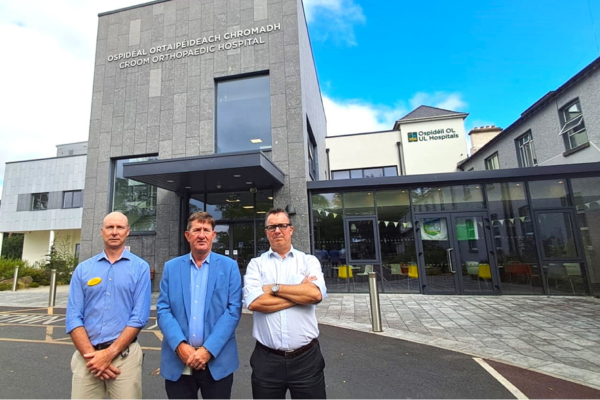Specialist physiotherapists driving improved patient access and wait times at Croom Orthopaedic Hospital

Friday September 13th, 2024 ¦ A TEAM of clinical specialist physiotherapists (CSPs) at Croom Orthopaedic Hospital is substantially improving access and treatment for orthopaedic and rheumatology patients, while also ensuring a dramatic reduction in wait times for those patients who require surgery.
The CSPs were Initially appointed in 2012 as part of a national effort to reduce orthopaedic and rheumatology consultant waiting lists that, across the health service, had grown to unmanageable volumes—up to 10 years in the most extreme cases.
In its first decade, the Croom CSP team helped reduce local surgical wait lists to three years. Since 2012, these have fallen further, to 5-9 months. In 2023 alone, some 2,500 patients were triaged or re-directed from the consultant waiting lists.
Having more than doubled from two CSPs initially to 4.5 (WTE) in 2024, the team has evolved into a dedicated musculoskeletal triage entity that efficiently triages, treats and/or refers patients into the most appropriate care pathway for their needs.
As well as making major inroads on waiting lists, the CSP team’s positive impact is being felt by all patients. Of patients surveyed by the CSP team last year, there is a 97.5% satisfaction rating with the service, with those surveyed commending the quality of service and the reassurance that comes with this, and particularly praising the clear guidance on home- and community-based exercise programmes.
Scott Murphy, CSP (MSK Triage), Croom Orthopaedic Hospital, explains that the story is an ongoing one, with all colleagues working intensively towards closer collaboration with community-based physiotherapy services, as well as continuing their work with GPs to ensure more targeted and appropriate referrals and thus more efficient and timely engagement with patients.
“The impact on waiting lists is significant, but the story of this team and what we’re doing is ongoing and evolving,” Scott said. “We’ve fulfilled our initial goal of reducing consultant waiting lists, particularly orthopaedic lists. More patients who need surgery are getting seen and treated faster, but the overall goal is to ensure solutions for all patients who are living with musculoskeletal pain.”
In the initial phase of the CSP Team’s development, reduction of consultant waiting lists was the main priority as dictated by the national plan. A significant part of this work was in educating patients that most orthopaedic and rheumatology issues can be effectively managed through self-care and exercise following engagement with the expertise of the CSP Team.
“We’re working on the ‘de-medicalisation’ of the process for orthopaedic and rheumatology patients”, Scott explained. “More patients with early onset osteoarthritis are understanding that in the vast majority of cases, a consultant appointment is not the answer. The evidence shows, and all our treatments are evidence-based, that the best treatment is exercise, most ideally through physiotherapy in the community. Even when that is not immediately available we have forged networks with amazing organisations like Limerick Sports Partnership, and utilised fantastic options like the HSE’s Living Well programme. It’s about looking at the entirety of the individual patient’s needs, the whole person, taking into account any comorbidities, and working with them to the point where they’re confident enough to manage their own exercise. Our work is about admission avoidance through patient empowerment.”
The outreach aspect of this work includes significant engagement with GPs in order to most efficiently target referrals from the moment someone with a rheumatology or orthopaedic issue presents at the doorway to the health service via their family doctor.
“And we also want to reassure that patients that this is a wrap-around service. We are working to the SlainteCare principle of Right Care, in the Right Place at the Right Time. So, the majority of patients will see us first, but perhaps their condition might be worse than we initially believed, and if that is the case, we in an embedded clinic with the consultants and we can bring that patient literally down the corridor and book the necessary surgical intervention there and then. Conditions change, and we have to respond to that,” Scott added.
For Mr Finbarr Condon, Consultant Orthopaedic Surgeon, the benefits of this process are clear, for consultants, for patients in need of surgical intervention for acute conditions, and for those who can manage their conditions through self-care. Mr Condon said: “The CSP team have made, and continue to make, a remarkable contribution to the care of patients in the Mid West. For the majority of patients, they are the first line and definitive care-givers. For the remaining patients, they have a pivotal communication role with the consultants and wider clinical staff. This improved communication allows patients who need a surgical opinion to reach the medical team not only faster but also with a clearer understanding of their problem.“
Dr Joe Devlin, Consultant Rheumatologist, added: “Patients attending our specialist physiotherapists are receiving both diagnosis and treatment advice much sooner than had they waited for a consultant appointment. This service has greatly improved access to care and we are continuing to work with our MSK physiotherapists to expand and enhance the service.”
Colum Moloney, Physiotherapy Manager-in-Charge, UL Hospitals Group said: “This service really highlights the impacts that dedicated specialist physiotherapy staff can achieve when working together as part of excellent Orthopaedic and Rheumatology teams. We are obviously delighted with the work done in reducing numbers on the consultants’ waiting lists, but we also recognise that these are patients and not just numbers and we need to continue to develop our physiotherapy services across the region to support all their individual needs. It’s so heartening, and exciting, to look back over a decade of work and chart the positive impact of this team, while working ever more closely with our community-based colleagues to maintain the trajectory of that progress into the future.”
Ends

